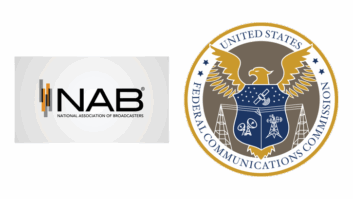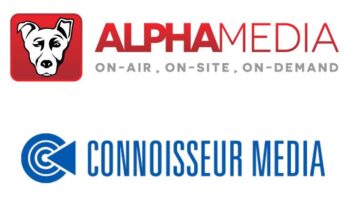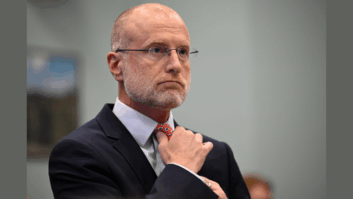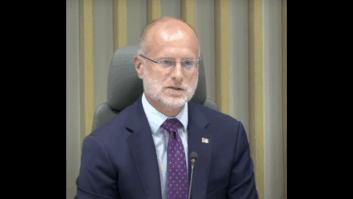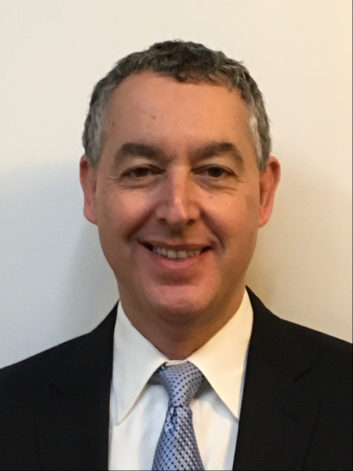
Radio World talked with Albert Shuldiner, chief of the FCC’s Audio Division, about how the commission was coping during the coronavirus shutdowns, as well as about various regulatory issues before the commission.
The commission effectively shut down its headquarters and moved to teleworking, like much of the radio industry. It sought to provide some relief to broadcasters, granting a series of waivers and extending the deadline for the quarterly issues and programs lists. It also eased the public file requirements placed upon broadcasters.
Chairman Ajit Pai said the commission was “acting quickly to make decisions” to help manage. During an online workshop in April, he said, “If there’s one area where bureaucracies struggle most, it’s doing anything fast. But during a pandemic, delays can be deadly. So the FCC has put a premium on making decisions as quickly as possible. We’re talking days, not months or years.”
Shuldiner said the chairman empowered the FCC’s division leaders to make regulatory decisions without the layers of review typically needed.
He spoke with Radio World’s Randy Stine in April.
Radio World: You spoke with NAB members recently in an online chat about what the FCC has been doing publicly and behind the scenes in regards to coronavirus. Radio has been especially hard hit. What should radio broadcasters know?
Al Shuldiner:The FCC staff is very aware of the impact of the coronavirus pandemic on broadcasters and the severe economic impact this is having on the radio industry. We are looking at ways that we can provide additional regulatory flexibility to help broadcasters navigate through this crisis.
Where stations have been able to provide us with specific information that the pandemic has impacted their operations, such as where stations have been forced to stop construction because key personnel have been infected and are quarantined or where parts have been delayed due to supply chain disruptions, we have provided regulatory relief where we can.
Similarly, we have worked with stations facing extreme economic problems to adjust their operations to save money. I encourage stations that are facing problems to contact us if they have approaches that might help save jobs or avoid taking a station off the air.
We have not provided relief in response to generalized requests based simply on unspecified impacts of the coronavirus, but we are prepared to respond quickly when broadcasters provide specific information and documentation that they have suffered a significant impact. And stations do not need to worry about making formal proposals. A number of stations have contacted me informally by email, and we have been able to provide prompt relief with minimal administrative delays.
RW: Will the FCC forgive or delay collection of regulatory fees, for radio stations hit by the economic downturn? How about the current license renewal process?
Shuldiner: We are looking at options to help broadcasters get through this economic downturn. I know there have been questions about regulatory fees, which Congress requires the commission to collect. While we are unable to waive these fees, the Media Bureau has been working with the commission’s Office of the Managing Director to help stations implement payment plans and to develop other relief to address cash shortages.
RW: Are there other postponements of deadlines or other regulatory processes? Are there Public File implications?
Shuldiner: The Media Bureau delayed the deadline for stations to upload first quarter issues/programs lists to their online public inspection files. For stations that were required to file renewal applications by April 1, 2020, we did not grant a blanket extension of time, but we addressed extension requests on a case-by-case basis. We processed about 25 of these requests and in all cases, each was granted the day it was submitted.
We and the Video Division will monitor developments leading up to the June 1 renewal application deadline. I expect we will address any problems for that date on a case-by-case basis as well. Similarly, we have been able to handle a few construction tolling requests on an individual basis. I think the biggest current outstanding question about deadlines is the status of FM translator construction permits scheduled to expire in January 2021.
We are looking at the ability of AM stations to make those investments right now and understand the need to provide more guidance on this issue well in advance of the deadline. I hope to have input for broadcasters early this summer.
RW: Do the FCC modernization initiatives continue during the COVID-19 outbreak, like possibly streamlining the license renewal process?
Shuldiner: We are fully engaged in all our work, including ongoing rulemakings. I am not aware of any changes that have been proposed to the renewal process, but we are actively working to complete our rulemaking on the local public notices that broadcasters must provide for renewal and other applications.
Our Second Further Notice of Proposed Rulemaking proposed a number of changes designed to streamline our existing rules. We received a lot of supporting comments from interested parties and expect to release revised rules before the summer. In conjunction with the ongoing work in that proceeding and in recognition of the impact of the coronavirus pandemic on broadcasters, we recently waived the requirement for broadcasters filing renewal applications in June 2020 to provide prefiling announcements of their renewal applications.
We plan to continue to advance our important media modernization initiatives and to continue to provide the industry with regulatory relief where possible.
RW: The pandemic has led to a number of churches and other organizations doing local broadcasts to their parking lots. Have there been cases where you have relaxed Part 15 compliance?
Shuldiner: We have encouraged churches and other organizations that have asked us for permission to broadcast to an audience to use streaming or call-to-listen services, or to partner with an existing broadcaster rather than relying on Part 15 devices.
I was very interested to learn recently of an initiative where a broadcaster is working with local schools in the communities it serves to air lessons on AM and FM stations during part of the day to ensure children without access to the internet can continue to complete their schoolwork. Using existing stations for this effort avoids the need for special authorizations.
Also, often low-cost Part 15 equipment being offered to churches and other organizations is not legal for use in the U.S. A properly certified and labeled Part 15 device comes with a permanent, manufacturer-affixed label certifying that the device complies with Part 15 of the FCC rules and displays an FCC ID number. Those devices should be able to provide a service radius of up to 200 feet under ideal conditions. Anything claiming to provide service beyond that distance is likely in violation of FCC rules.
Although we have provided a very limited number of special authorizations for governmental entities and medical centers with a public health need to broadcast using power levels that exceed Part 15 criteria, we are not able to provide other organizations with licenses for larger coverage areas, due to the public safety and broadcast interference concerns.
RW: If the FCC allows that option, what can you say to radio broadcasters concerned about possible interference?
Shuldiner: We review all requests to ensure they are on channels that minimize the potential interference. Any special authorizations we provide are on a noninterference basis. And the stations we have authorized at this point are operating at power levels that are extremely unlikely to cause interference. However, we remain prepared to address any interference that arises and will work with broadcasters to address any problems they experience.
RW: New rules were put in place last year to streamline the sometimes contentious process of working out interference complaints around FM translators. Can you report on how that›s going? Has the frequency of complaints changed?
Shuldiner: We have seen some additional claims from stations, but my sense is that the volume is pretty consistent with what we have seen for the last few years. The new rules have not created a spike in complaints but have helped us weed out some of the less sustainable complaints.
In our experience, most interference problems can be resolved by the stations, and our new rules strongly encourage stations to attempt to resolve problems without the FCC. But there are cases where we have found real interference problems and taken appropriate action to remedy the problem.
In the most contentious cases, the parties often do not act reasonably and engage in an endless war of pleadings and accusations. This is not an effective way to work with commission staff or to resolve the matter. I encourage all parties to work with us to find productive solutions.
RW: We’ve seen at least one ruling where it appeared that the company raising a complaint had provided documentation but that the petition to deny was refused because they didn’t follow every letter of the process. Is it possible the system is too stringent now?
Shuldiner: I don’t want to comment on the merits of a particular case, but we think it is important for stations filing interference claims to comply with the procedural requirements we adopted. We believe that will help avoid invalid claims and avoid wasting time and resources for all parties.
RW: The comment period on allowing all-digital on the AM band has closed, and most of the comments were clearly in support. It seems likely that the FCC will confirm its tentative plan soon. What can you share with us?
Shuldiner: There were a number of comments and reply comments filed in that proceeding. It’s a little premature to share the staff’s thinking on the outcome of the proceeding, but the staff members responsible for that item are reviewing the comments and hope to have more guidance for AM broadcasters later this year.
“We do not view waivers as a workable solution for something as significant as a new class of service, particularly when there is an open rulemaking on the same topic.” — Al Shuldiner
RW: What is the status of the FM Class C4 proposal? Is it possible a waiver approach could be used in the interim for those FM stations interested?
Shuldiner: Although a number of broadcasters have expressed support for a rulemaking on Class C4, there also has been significant opposition from other broadcasters, particularly on the issue of Section 73.215 of the commission’s rules.
We do not view waivers as a workable solution for something as significant as a new class of service, particularly when there is an open rulemaking on the same topic. We will continue to study this issue to see if we can determine a way to proceed.
“We recognize the transition from CDBS to LMS has not been a smooth one. No one is more frustrated with the pace of the transition or the glitches we have experienced than me.” — Al Shuldiner
RW: We are told by broadcasters they feel as if they are struggling with regard to Media Bureau databases for FM. Many filings have transitioned to LMS, but many CDBS records and fields apparently have not made the trip. Some broadcasters have found it necessary to run searches using both databases to be sure they pick up on all potential records, allocations and applications. What is the plan for completing this transition?
Shuldiner: We recognize the transition from CDBS to LMS has not been a smooth one. No one is more frustrated with the pace of the transition or the glitches we have experienced than me. I can assure you the Audio Division staff has put in a lot of hours to design and test the system, but sometimes we cannot anticipate all the problems.
It is important to note that information flows from CDBS to LMS but not the other way around. CDBS is still the best place to find older information, but anything that has been filed in LMS will not appear in CDBS.
Even with all of us teleworking, we are making good progress on the next phase of the LMS transition and hope to have the assignment and transfer forms working in LMS in the second half of the year. After that, we plan to transition our AM forms and historical information. As we move more and more functionality to LMS, the need to check CDBS will go away. But right now, it is best to check both databases for completeness.
I say thank you to all our users who have shown tremendous patience during this transition. But please do not suffer in silence — if people are experiencing problems, they should let us know so we can address them.
RW: One of the important tasks the Audio Division does is to process assignment and transfer applications for station sales. In January, one of your well-known attorneys who was responsible for supervising station sales, Mike Wagner, retired. Who in the Audio Division is taking Mike’s place, and have there been any issues with the transition?
Shuldiner: Mike Wagner’s retirement was a big loss for the Audio Division, but I spoke to Mike recently and was pleased that he is enjoying his retirement. In March, we were very lucky to have Chris Clark join the Audio Division from the Media Bureau’s Industry Analysis Division. Chris is our newest assistant division chief and has taken over responsibility for the assignment and transfer application process. He also is involved in our ongoing license renewal process and other matters.
The staff’s move to full-time telework in March made the transition a little complicated for us, but the overall transition has been pretty smooth, and the feedback I have received from broadcasters indicates our processing has not been an impediment to completing transactions. We are fortunate to have a skilled group, headed by Annette Smith, that can keep the process moving forward, even while working remotely. Chris and Annette are available to the public to answer questions and resolve problems relating to pending applications.
“We were told the FCC’s move has been delayed from the end of June until the end of the summer, but we are waiting to see if the pandemic has any further impact on that schedule.” — Al Shuldiner
RW: The FCC was scheduled to move from the Portals to a location north of Union Station in Washington, D.C., this summer. What is now the status of that, and do you expect to have any attrition of Audio Division personnel from the move?
Shuldiner: We were told the FCC’s move has been delayed from the end of June until the end of the summer, but we are waiting to see if the pandemic has any further impact on that schedule. I don’t expect any significant attrition as a result of the move. I know we have a few people that are getting closer to retirement age, so we may see a few retirements in the future. But we have been fortunate to have had a few engineers and attorneys join the Audio Division over the past year and a half. With that additional staff, we are well positioned to continue to handle our work even if we experience a little attrition from the move.
RW: Reasonable, accommodating and flexible. Several communication attorneys have used those words to describe the FCC in recent weeks. Do you sense a change in how some broadcasters perceive the FCC?
Shuldiner: I like to think that the Audio Division is always responsive and helpful. We have a tremendous group of talented and dedicated individuals. We cannot accommodate every request we receive, and sometimes we have to deny requests or take enforcement action against bad actors. But we try to be fair and reasonable.
The pandemic has allowed us to have more detailed discussions with broadcasters about individual needs and situations. And it has given us the room to be creative to find solutions to unusual and extreme problems. I hope we will be able to maintain that approach when we return to regular operations and that the radio industry will continue to view us as a resource that is looking for reasonable solutions.



